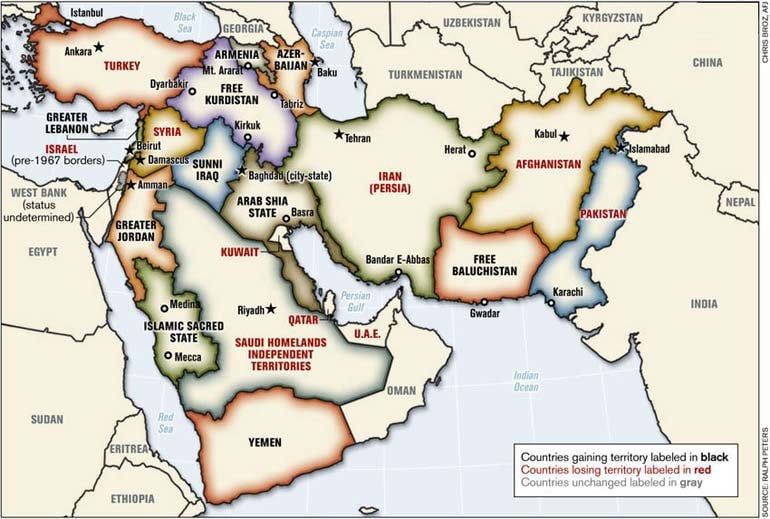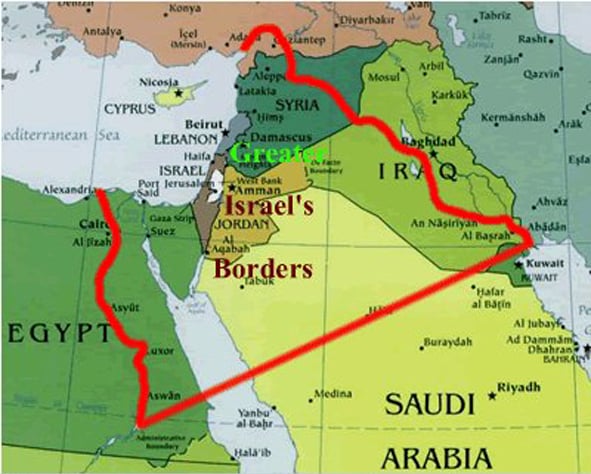"Greater Israel": The Zionist Plan for the Middle East

President Donald Trump had confirmed in January 2017 his support of Israel’s illegal settlements (including his opposition to UN Security Council Resolution 2334, pertaining to the illegality of the Israeli settlements in the occupied West Bank). The Trump administration expressed its recognition of Israeli sovereignty over the Golan Heights. And now the entire West Bank is being annexed to Israel.
Under the Biden administration, despite rhetorical shifts in the political narrative, Washington remains supportive of Israel plans to annex the entire Jordan River valley as well the illegal settlements in the West Bank.
Bear in mind: The Greater Israel design is not strictly a Zionist Project for the Middle East, it is an integral part of US foreign policy, its strategic objective is to extend US hegemony as well as fracture and balkanize the Middle East.
In this regard, Washington’s strategy consists in destabilizing and weakening regional economic powers in the Middle East including Turkey and Iran. This policy –which is consistent with the Greater Israel– is accompanied by a process of political fragmentation.
Since the Gulf war (1991), the Pentagon has contemplated the creation of a “Free Kurdistan” which would include the annexation of parts of Iraq, Syria and Iran as well as Turkey
“The New Middle East”: Unofficial US Military Academy Map by Lt. Col. Ralph Peters
According to the founding father of ZionismTheodore Herzl, “the area of the Jewish State stretches: “From the Brook of Egypt to the Euphrates.” According to Rabbi Fischmann, “The Promised Land extends from the River of Egypt up to the Euphrates, it includes parts of Syria and Lebanon.”
When viewed in the current context, including the siege on Gaza, the Zionist Plan for the Middle East bears an intimate relationship to the 2003 invasion of Iraq, the 2006 war on Lebanon, the 2011 war on Libya, the ongoing wars on Syria, Iraq and Yemen, not to mention the political crisis in Saudi Arabia.
The “Greater Israel” project consists in weakening and eventually fracturing neighboring Arab states as part of a US-Israeli expansionist project, with the support of NATO and Saudi Arabia. In this regard, the Saudi-Israeli rapprochement is from Netanyahu’s viewpoint a means to expanding Israel’s spheres of influence in the Middle East as well as confronting Iran. Needless to day, the “Greater Israel” project is consistent with America’s imperial design.
“Greater Israel” consists in an area extending from the Nile Valley to the Euphrates. According to Stephen Lendman,
“A near-century ago, the World Zionist Organization’s plan for a Jewish state included:
• historic Palestine;
• South Lebanon up to Sidon and the Litani River;
• Syria’s Golan Heights, Hauran Plain and Deraa; and
• control of the Hijaz Railway from Deraa to Amman, Jordan as well as the Gulf of Aqaba.
Some Zionists wanted more – land from the Nile in the West to the Euphrates in the East, comprising Palestine, Lebanon, Western Syria and Southern Turkey.”
The Zionist project has supported the Jewish settlement movement. More broadly it involves a policy of excluding Palestinians from Palestine leading to the annexation of both the West Bank and Gaza to the State of Israel.
The Project of “Greater Israel” is to create a number of proxy States, which could include parts of Lebanon, Jordan, Syria, the Sinai, as well as parts of Iraq and Saudi Arabia. (See map).
According to Mahdi Darius Nazemroaya in a 2011 Global Research article, The Yinon Plan was a continuation of Britain’s colonial design in the Middle East:
“[The Yinon plan] is an Israeli strategic plan to ensure Israeli regional superiority. It insists and stipulates that Israel must reconfigure its geo-political environment through the balkanization of the surrounding Arab states into smaller and weaker states.
Israeli strategists viewed Iraq as their biggest strategic challenge from an Arab state. This is why Iraq was outlined as the centerpiece to the balkanization of the Middle East and the Arab World. In Iraq, on the basis of the concepts of the Yinon Plan, Israeli strategists have called for the division of Iraq into a Kurdish state and two Arab states, one for Shiite Muslims and the other for Sunni Muslims. The first step towards establishing this was a war between Iraq and Iran, which the Yinon Plan discusses.
The Atlantic, in 2008, and the U.S. military’s Armed Forces Journal, in 2006, both published widely circulated maps that closely followed the outline of the Yinon Plan. Aside from a divided Iraq, which the Biden Plan also calls for, the Yinon Plan calls for a divided Lebanon, Egypt, and Syria. The partitioning of Iran, Turkey, Somalia, and Pakistan also all fall into line with these views. The Yinon Plan also calls for dissolution in North Africa and forecasts it as starting from Egypt and then spilling over into Sudan, Libya, and the rest of the region.
“Greater Israel” would require the breaking up of the existing Arab states into small states.
“The plan operates on two essential premises. To survive, Israel must
1) become an imperial regional power, and
2) must effect the division of the whole area into small states by the dissolution of all existing Arab states.
Small here will depend on the ethnic or sectarian composition of each state. Consequently, the Zionist hope is that sectarian-based states become Israel’s satellites and, ironically, its source of moral legitimation… This is not a new idea, nor does it surface for the first time in Zionist strategic thinking. Indeed, fragmenting all Arab states into smaller units has been a recurrent theme.” (Yinon Plan, see below)
Viewed in this context, the US-NATO led wars on Syria and Iraq are part of the process of Israeli territorial expansion.
In this regard, the defeat of US sponsored terrorists (ISIS, Al Nusra) by Syrian Forces with the support of Russia, Iran and Hezbollah constitute a significant setback for Israel.
Michel Chossudovsky, Global Research, September 06, 2015, updated September 13, 2019
The Zionist Plan for the Middle East
Translated and edited by
Israel Shahak
The Israel of Theodore Herzl (1904) and of Rabbi Fischmann (1947)
In his Complete Diaries, Vol. II. p. 711, Theodore Herzl, the founder of Zionism, says that the area of the Jewish State stretches: “From the Brook of Egypt to the Euphrates.”
Rabbi Fischmann, member of the Jewish Agency for Palestine, declared in his testimony to the U.N. Special Committee of Enquiry on 9 July 1947: “The Promised Land extends from the River of Egypt up to the Euphrates, it includes parts of Syria and Lebanon.”
The notes by the author follow the text under the title.
To avoid confusion, I did not add any notes of my own, but have put the substance of them into this Foreward and the Concluding Observations at the end. I have, however, emphasized some portions of the text.
Israel Shahak, June 13, 1982
A Strategy for Israel in the Nineteen Eighties
by Oded Yinon
This essay originally appeared in Hebrew in KIVUNIM (Directions), A Journal for Judaism and Zionism; Issue No, 14–Winter, 5742, February 1982, Editor: Yoram Beck. Editorial Committee: Eli Eyal, Yoram Beck, Amnon Hadari, Yohanan Manor, Elieser Schweid. Published by the Department of Publicity/The World Zionist Organization, Jerusalem.
At the outset of the nineteen eighties the State of Israel is in need of a new perspective as to its place, its aims and national targets, at home and abroad. This need has become even more vital due to a number of central processes which the country, the region and the world are undergoing. We are living today in the early stages of a new epoch in human history which is not at all similar to its predecessor, and its characteristics are totally different from what we have hitherto known. That is why we need an understanding of the central processes which typify this historical epoch on the one hand, and on the other hand we need a world outlook and an operational strategy in accordance with the new conditions. The existence, prosperity and steadfastness of the Jewish state will depend upon its ability to adopt a new framework for its domestic and foreign affairs.
This epoch is characterized by several traits which we can already diagnose, and which symbolize a genuine revolution in our present lifestyle. The dominant process is the breakdown of the rationalist, humanist outlook as the major cornerstone supporting the life and achievements of Western civilization since the Renaissance. The political, social and economic views which have emanated from this foundation have been based on several “truths” which are presently disappearing–for example, the view that man as an individual is the center of the universe and everything exists in order to fulfill his basic material needs. This position is being invalidated in the present when it has become clear that the amount of resources in the cosmos does not meet Man’s requirements, his economic needs or his demographic constraints. In a world in which there are four billion human beings and economic and energy resources which do not grow proportionally to meet the needs of mankind, it is unrealistic to expect to fulfill the main requirement of Western Society, 1 i.e., the wish and aspiration for boundless consumption. The view that ethics plays no part in determining the direction Man takes, but rather his material needs do–that view is becoming prevalent today as we see a world in which nearly all values are disappearing. We are losing the ability to assess the simplest things, especially when they concern the simple question of what is Good and what is Evil.
The vision of man’s limitless aspirations and abilities shrinks in the face of the sad facts of life, when we witness the break-up of world order around us. The view which promises liberty and freedom to mankind seems absurd in light of the sad fact that three fourths of the human race lives under totalitarian regimes. The views concerning equality and social justice have been transformed by socialism and especially by Communism into a laughing stock. There is no argument as to the truth of these two ideas, but it is clear that they have not been put into practice properly and the majority of mankind has lost the liberty, the freedom and the opportunity for equality and justice. In this nuclear world in which we are (still) living in relative peace for thirty years, the concept of peace and coexistence among nations has no meaning when a superpower like the USSR holds a military and political doctrine of the sort it has: that not only is a nuclear war possible and necessary in order to achieve the ends of Marxism, but that it is possible to survive after it, not to speak of the fact that one can be victorious in it.2



No comments:
Post a Comment